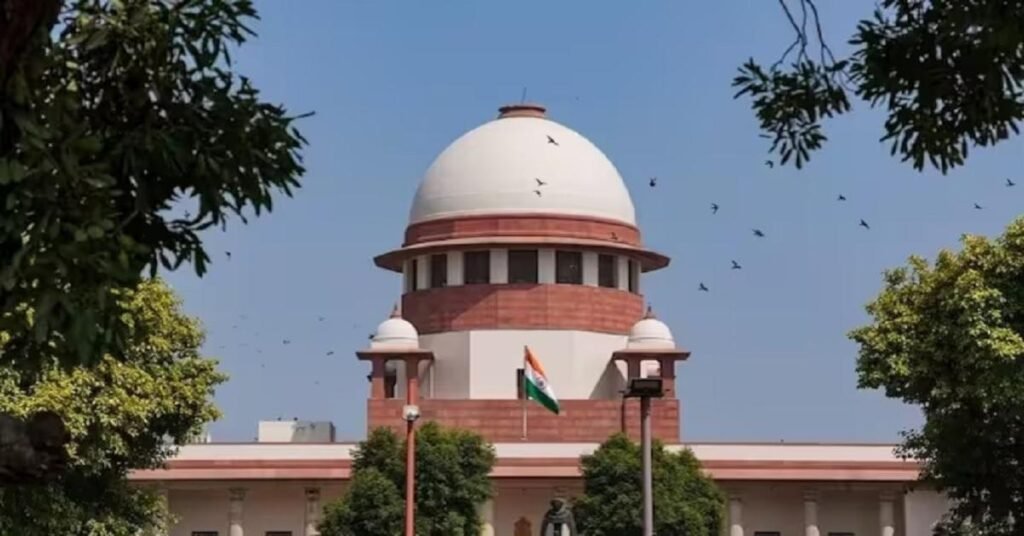Our Blogs

Filing of e-form DPT-3 with Registrar of Companies on or before 30th June every year
Meaning: Every Indian entity who has taken deposits or conducted certain specified transactions, not covered as deposits, is required to…
Read More
Confiscation Of Vehicle Can’t Be Ordered Without Hearing Its Registered Owner: Supreme Court
The Supreme Court has held that an order passed under the Narcotic Drugs and Psychotropic Substances Act 1985 (NDPS Act)…
Read More
Comments have to be made within public view, to punish a person for Casteist Insults Under SC/ ST Act: Supreme Court
The Supreme Court, while deciding a case arising out of a complaint made for an offence under the Scheduled Caste…
Read More
Steps to register a Limited Liability Partnership (LLP)
Limited Liability Partnership (LLP) has become a preferred form of organization among entrepreneurs in India. An LLP incorporates the benefits…
Read More
Starting a Company in India: A Comprehensive Guide
Starting a company in India can be an exhilarating journey into the world of entrepreneurship. India, with its vast market…
Read More
Meaning:
Every Indian entity who has taken deposits or conducted certain specified transactions, not covered as deposits, is required to file an annual return in form DPT-3, or the “Return of Deposits”.
Specified transactions (not covered as deposits):
a) Any amount received from any Government Body
b) Any amount received from any foreign body or from any person resident outside India
c) Any amount received as a loan form any Banking company or Banking institution notified by Central Government
d) Any amount received as loan from any public financial institution or insurance company etc
e) Any amount received by the Company from any other company
f) Any amount raised by the issue of bonds or debentures secured by a first charge or a charge ranking pari passu with the first charge on any assets
g) Any amount received by the Company form any person who at the time of receipt was the director of the Company or any relative of the director
h) Any amount received as bonds or debentures compulsorily convertible into shares of the company within ten years
i) Any amount received against issue of any commercial paper as per RBI guideline.
j) Any non-interest-bearing amount received and held in trust.
k) Any amount of twenty-five lakh rupees or more received by a startup company, by way of convertible note
l) Any amount received by way of subscription in respect of chit fund
m) Any amount received by a Nidhi company in accordance with the rules made under section 406 of the Act.
n) Any amount brought in by promoters of the company by way of unsecured loans
o) Any amount received by the Company from any other company
p) As advance received and allowed by any sectoral regulator or in accordance with directions of the Government
q) As an advance towards consideration for providing future services in the form of a warranty or maintenance contract
r) Any amount received as a security deposit for performance of the contract of supply of goods or provision of services.
s) Any amount received in the course of, or for the purpose of business as an advance for supply or goods or provision of services etc
t) Any amount brought in by promoters by way of unsecured loans in pursuance of the stipulation of any lending financial institution.
u) Any amount received as advance for subscription towards publication, to be adjusted against receipt of such publications.
v) Any amount received by company under any collective Investment scheme in compliance with regulations framed by SEBI.
w) a startup company, by way of convertible note in a single tranche, from a person.
x) An amount received from any investment funds, mutual fund, real estate etc
y) Any non-interest-bearing amount received and held in trust.
z) Any amount received as an advance received in connection with consideration for any immovable property
Legislation: Section 73 of the Companies Act, 2013 read with Rule 16 & Rule 16A of the Companies (Acceptance of Deposit) Rules, 2014, mandate such filing.
Coverage: Form DPT-3 filing is mandatory for all companies — private, public, one-person, and Section 8—except for certain entities specified under Rule 1 of the Companies (Acceptance of Deposits) Rules, 2014.
Exemptions Include banking companies, NBFCs, housing finance companies, companies specified by the Central Government in consultation with the RBI, and government companies exempted under Rule 16.
Frequency:
Once in a financial year.
Reporting period:
Within 90 days of the financial year’s end, i.e. for financial year ended March 31, 2024 by June 30, 2024.

The Supreme Court has held that an order passed under the Narcotic Drugs and Psychotropic Substances Act 1985 (NDPS Act) for the confiscation of a vehicle will be illegal if it was passed without hearing the owner of the vehicle.
Referring to Section 63 of the NDPS Act, the Court said that an order confiscation of an article cannot be passed until the expiry of one month from the date of seizure or without hearing any person who may claim any right thereto.
A bench comprising Justices JB Pardiwala and Manoj Misra was hearing an appeal filed against the order of the Rajasthan High Court affirming the confiscation of vehicle (a dumper) under the NDPS Act. The appeal was filed by the registered owner of the vehicle.
A case was registered against the appellant and two other accused for the offences under the NDPS Act. However, the appellant absconded and the trial was held only against the other two accused. After the trial, the trial court acquitted the other two accused giving them the benefit of doubt. However, the trial court also ordered the confiscation of the vehicle.
After the acquittal of the other two accused, the appellant came to be arrested. He was released on bail. He challenged the order of the trial court for confiscation of the vehicle on the ground that he was not heard. The High Court rejected his challenge.
The Supreme Court set aside the direction for confiscation after noting that the owner was not heard during the proceedings.
“The plain reading of Section 63 indicates that the court cannot order confiscation of an article until the expiry of one month from the date of seizure or without hearing any person who may claim any right thereto. It is true that at the time of the order of confiscation of the dumper, the appellant herein was not arrested. Had he been put to trial along with the other two co- accused, probably he would have submitted before the trial court why the confiscation order may not be passed.”
“The fact remains that the appellant is the registered owner of the dumper. In terms of the provisions of Section 63 of the NDPS Act, the appellant has a right to be heard by the court before the final order of confiscation is passed and the seized vehicle is put to auction,” the Court observed.
The appellant was directed to file an application before the trial court for opportunity of hearing regarding the confiscation. After the application is filed, the trial court was directed to decide within a period of two weeks.

The Supreme Court, while deciding a case arising out of a complaint made for an offence under the Scheduled Caste and Scheduled Tribe (Prevention of Atrocities) Act, 1989 (Act), observed that an allegation of insult has to satisfy the requirement of having been made within public view.
The Supreme Court on Friday ruled that a person cannot be prosecuted for alleged offences under the SC, ST (Prevention of Atrocities) Act unless casteist remarks were made in “public view” with an intention to humiliate.
The bench of Justices M.M Sundresh and S.V.N. Bhatti passed the verdict while setting aside a Delhi High Court judgment that had taken a contrary view and directed the registration of an FIR against Priti Agarwalla and five others besides the station house officer of Fatehpur Beri police station.
The appellants were represented by senior advocate Sidharth Luthra while complainant Praveen Kumar aka Prashant was represented by Kapil Nath Modi. Besides being an advocate, Modi is the administrator of the Olympic Riding and Equestrian Academy, Eastern Jaunapur, New Delhi (OREA).
Praveen and most of the appellants used to train at the OREA where skirmishes reportedly broke out, resulting in the filing of complaints and counter-complaints.
Modi submitted that the appellants often hurled casteist slurs at Praveen, saying equestrian sports were meant for the rich and not a “Chamar” like him.
However, Luthra said the allegations were fabricated. He maintained that the offence alleged against the appellants was stated under Sections 3(1)(r) and 3(1)(s) of the SC, ST (Prevention of Atrocities) Act, 1989. To constitute an offence under Section 3(1)(r), the complaint must aver that the commission or omission had been made in public view, he said.
He added that the complaint did not satisfy the required ingredients of an offence under the Act.
Agreeing with the arguments, Justice Bhatti said Section 3(1)(r) of the SC, ST Act identifies as an offence an intentional insult or intimidation intended to humiliate a member of a Scheduled Caste or a Scheduled Tribe in public view.
“The cumulative effect of the structured application to a given situation is that the intentional insult or abuse coupled with the humiliation is made in any place within public view. The expression ‘in any place within public view’ has an important role to play in deciding whether the allegation attracts the ingredients of an offence or not,” Justice Bhatti observed.
“The accusation of intentionally abusing and humiliating Respondent No. 2 (Praveen) spans over a period of two years between 2016 and 2018. The allegation prima facie appears to be an omnibus and ambiguous allegation.”
The bench said the specific allegation in the complaint on Appellant No. 2 is that Appellant No. 2 had called Respondent No. 2 “Chuda” and “Chamar”, among other things.
“The allegation does not refer to the place nor the public view before whom it was made. An important test for ‘in any place within public view’ is within the view of persons other than the complainant,” the apex court noted.
“In this case, we are not examining whether OREA is a private or public place, but to appreciate the alleged offence. We juxtapose the allegation(s) with the requirement of insulting or intimidating in any place within public view is satisfied or not.”

Limited Liability Partnership (LLP) has become a preferred form of organization among entrepreneurs in India. An LLP incorporates the benefits of a partnership firm and a company. As the name suggests, an LLP is a partnership firm established by a minimum of two partners who enter into an LLP agreement. However, the partners of an LLP have limited liability and the LLP has perpetual succession just like a company.
The concept of the Limited Liability Partnership (LLP) was introduced in India in 2008. The Limited Liability Partnership Act, 2008 regulates the LLPs in India. Minimum two partners are required to incorporate an LLP.
Step 1: Obtain Digital Signature Certificate (DSC)
Before initiating the process of registration, you must apply for the digital signature of the designated partners of the proposed LLP. This is because all the documents for LLP are filed online and are required to be digitally signed. So, the designated partner must obtain their digital signature certificates from government recognized certifying agencies. Here is a list of such certified agencies. The cost of obtaining DSC varies depending upon the certifying agency. Also, you should obtain class 3 category of DSC.
Step 2: Apply for Designated Partner Identification Number (DPIN)
You have to apply for the DPIN of all the designated partners or those intending to be designated partners of the proposed LLP. The application for allotment of DPIN has to be made in Form DIR-3. You have to attach the scanned copy of documents (usually Aadhaar and PAN) to the form. The form should also be signed by a Company Secretary, Chartered Accountant or Cost Accountant in full-time practice.
Only a natural person can be a Designated Partner of an LLP. Hence, the DPIN can be obtained by only natural persons and not artificial legal entities like a company, LLP, OPC, association of persons, etc.
Step 3: Name Approval
RUN-LLP (Reserve Unique Name-Limited Liability Partnership) is filed for the reservation of the name of the proposed LLP which shall be processed by the Central Registration Centre. But before quoting the name in the form, it is recommended that you use the free name search facility on MCA portal.
The system will provide the list of closely resembling names of existing companies/LLPs based on the search criteria filled up. This will help you in choosing names not similar to already existing names. The registrar will approve the name only if the name is not undesirable in the opinion of the Central Government and does not resemble any existing partnership firm or an LLP or a body corporate or a trademark.
A re-submission of the form shall be allowed to be made within 15 days for rectifying the defects. There is a provision to provide for 2 proposed names of the LLP. You must must apply for LLP incorporation within 3 months of the date of name approval by the MCA.
Step 4: Incorporation of LLP
- The form used for incorporation is FiLLiP (Form for incorporation of Limited Liability Partnership) which shall be filed with the Registrar who has jurisdiction over the state in which the registered office of the LLP is situated. The form will be an integrated form.
- Fees as per Annexure ‘A’ shall be paid.
- This form also provides for applying for allotment of DPIN, if an individual who is to be appointed as a designated partner does not have a DPIN or DIN.
- The application for allotment shall be allowed to be made by two individuals only.
- The application for name reservation may be made through FiLLiP too.
- If the name that is applied for is approved, then this approved and reserved name shall be filled as the proposed name of the LLP.
Step 5: File Limited Liability Partnership (LLP) Agreement
LLP agreement governs the mutual rights and duties amongst the partners and also between the LLP and its partners.
- LLP agreement must be filed in Form 3 online on MCA Portal.
- Form 3 for the LLP agreement has to be filed within 30 days of the date of incorporation.
- The LLP Agreement has to be printed on Stamp Paper. The value of Stamp Paper is different for every state.

Starting a company in India can be an exhilarating journey into the world of entrepreneurship. India, with its vast market and growing economy, offers numerous opportunities for both local and international entrepreneurs. However, navigating the regulatory and bureaucratic landscape can be challenging. This guide aims to simplify the process and highlight how Roopali Grover and Associates can assist you in forming your company with ease.
1. Decide on Your Business Structure
The first step in starting your company is deciding the type of business structure that suits your needs. India offers several types of business entities, including Sole Proprietorship, Partnership, Limited Liability Partnership (LLP), Private Limited Company, and Public Limited Company. Each structure has its benefits and requirements, so choosing the right one is crucial.
- Sole Proprietorship: This is suitable for small businesses with minimal regulatory compliance.
- Partnership: This involves two or more people who agree to share the profits of a business.
- Limited Liability Partnership (LLP): It provides the benefits of limited liability while allowing its members the flexibility of organizing their internal structure as a partnership.
- Private Limited Company: Most recommended for serious entrepreneurs as it is scalable and has limited liability, ensuring that personal assets are protected.
- Public Limited Company: Suitable for large businesses, allowing them to issue shares to the public.
2. Obtain a Digital Signature Certificate (DSC)
The next step involves obtaining a Digital Signature Certificate (DSC), which is necessary for filing the registration forms online. The DSC is issued by authorized certifying authorities under the Ministry of Corporate Affairs.
3. Acquire Director Identification Number (DIN)
Anyone intending to be a director in an Indian company must obtain a Director Identification Number (DIN). It can be applied for online and is mandatory for forming a company.
4. Name Approval and Reservation
Before incorporating your company, you need to get your company name approved by the Ministry of Corporate Affairs. You can submit up to two names for consideration, which should be unique and descriptive of your business activities.
5. File for Incorporation
Once the name is approved, you can proceed with the incorporation of your company by filing the necessary forms with the Registrar of Companies (RoC). This includes the Memorandum of Association (MoA) and Articles of Association (AoA), which detail the company’s constitution and rules.
6. PAN, TAN, and Bank Account
After the company is incorporated, you will need to obtain a Permanent Account Number (PAN) and Tax Deduction and Collection Account Number (TAN). These are crucial for tax purposes. Additionally, you should open a bank account in the name of your company to manage finances effectively.
7. Regulatory Compliance
Depending on the type of business and industry, you might need to obtain additional licenses and permits. Regular compliance with tax filings and annual returns is also mandatory to keep your company in good standing.
Seek Expert Guidance from Roopali Grover and Associates
Navigating the process of company formation in India can be complex. This is where Roopali Grover and Associates come into play. With a team of experienced professionals, we specialize in corporate law and business incorporation services. Whether it’s handling legal documentation, ensuring compliance with regulatory requirements, or providing bespoke advice tailored to your business needs, Roopali Grover and Associates will guide you through each step, ensuring that setting up your company in India is as smooth and hassle-free as possible.
Embarking on your business journey in India doesn’t have to be daunting. With the right guidance and support, you can establish a successful company and start building your legacy in one of the world’s most dynamic markets.
Get in touch with us: [email protected]